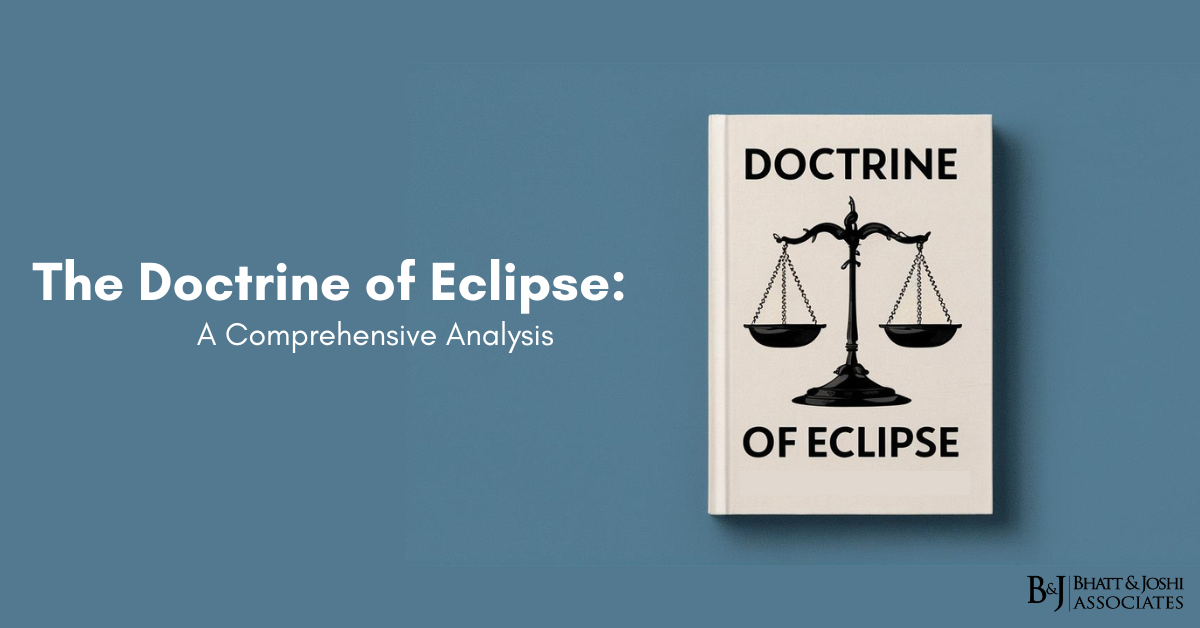Introduction
The doctrine of eclipse is a fundamental concept in constitutional law, particularly relevant in countries with a written constitution that includes provisions for fundamental rights. This doctrine addresses the complex situation that arises when a law, valid at the time of its enactment, becomes inconsistent with fundamental rights that are subsequently introduced or modified. The doctrine of eclipse provides a nuanced approach to dealing with such laws, balancing the principles of constitutional supremacy with legislative intent and practical governance considerations.
Historical Context and Development
The doctrine of eclipse has its roots in the evolving nature of constitutional law and the recognition that legal systems must adapt to changing societal norms and values. It emerged as a response to the challenges posed by pre-existing laws that conflicted with newly established fundamental rights, particularly in countries that underwent significant constitutional reforms or transitions to independence.
In many jurisdictions, the doctrine’s development can be traced back to landmark court decisions that grappled with the status of laws enacted before the adoption of a new constitution or the introduction of a bill of rights. These cases often involved laws that were valid when enacted but became problematic in light of new constitutional provisions.
The doctrine’s evolution reflects a judicial attempt to reconcile the principle of constitutional supremacy with the practical realities of governance and the need for legal continuity. It acknowledges that while the constitution is the supreme law of the land, an abrupt invalidation of all inconsistent pre-existing laws could lead to legal chaos and administrative difficulties.
Core Principles of the Doctrine
The doctrine of eclipse is built on several key principles that guide its application in constitutional law. The primary principle is that of conditional validity. According to this principle, a law that becomes inconsistent with fundamental rights is not automatically void ab initio (from the beginning) but is instead overshadowed or eclipsed by the fundamental right to the extent of the inconsistency.
Another crucial principle is that of revival. The doctrine posits that if the inconsistency is removed – for example, through a constitutional amendment that modifies the relevant fundamental right – the eclipsed law can potentially “revive” and become fully operational again.
The doctrine also embodies the principle of partial invalidity. It recognizes that a law may not be entirely inconsistent with fundamental rights and allows for the possibility that only the inconsistent portions of the law are eclipsed, while the rest remains valid and enforceable.
Lastly, the doctrine reflects the principle of prospective application. It generally holds that the eclipse takes effect from the date the fundamental rights come into force, not retrospectively from the date of the law’s enactment.
Application and Scope
The doctrine of eclipse primarily applies to pre-constitutional laws – those enacted before the adoption of the constitution or the incorporation of fundamental rights. Its application to post-constitutional laws is more limited and subject to debate in legal circles.
In practice, when a court determines that a pre-constitutional law is inconsistent with a fundamental right, it doesn’t strike down the law entirely. Instead, the law is considered inoperative to the extent of its inconsistency. This approach allows for a more nuanced treatment of laws, recognizing that they may have both valid and invalid aspects.
The doctrine is particularly relevant in cases involving discriminatory laws or those that infringe on newly recognized fundamental rights. For example, a law that discriminates based on gender might become eclipsed when a constitution introduces a right to equality. However, if the constitutional provision on equality is later amended to allow for certain forms of positive discrimination, the eclipsed portions of the law might revive.
It’s important to note that the doctrine of eclipse doesn’t apply to laws that are inherently beyond the competence of the legislature. If a law was enacted by a body that lacked the authority to make such a law in the first place, it would be considered void ab initio rather than eclipsed.
Comparison with Other Constitutional Doctrines
The doctrine of eclipse is often compared and contrasted with other constitutional doctrines, particularly the doctrine of severability and the concept of void ab initio. While these doctrines share some similarities in addressing constitutional inconsistencies, they have distinct applications and implications.
The doctrine of severability allows courts to strike down only the unconstitutional portions of a law while preserving the rest. In contrast, the doctrine of eclipse doesn’t involve striking down any part of the law but rather rendering certain aspects inoperative.
The concept of void ab initio holds that an unconstitutional law is invalid from its inception. The doctrine of eclipse, however, recognizes that a law may have been valid when enacted and only became inconsistent later due to constitutional changes.
Understanding these distinctions is crucial for legal practitioners and scholars in determining the appropriate approach to constitutional challenges to existing laws.
Challenges and Criticisms
While the doctrine of eclipse provides a flexible approach to dealing with constitutional inconsistencies, it is not without its challenges and critics. One of the main criticisms is that it creates uncertainty in the law. Since eclipsed laws are not formally repealed or struck down, there can be confusion about their status and applicability.
Another challenge lies in determining the extent of the eclipse. Courts must carefully delineate which aspects of a law are inconsistent with fundamental rights and to what degree, a task that can be complex and subject to varying interpretations.
Critics also argue that the doctrine may sometimes perpetuate the existence of laws that are fundamentally at odds with constitutional values, even if they are rendered inoperative. This situation can send mixed messages about the legal system’s commitment to constitutional principles.
Furthermore, the potential for revival of eclipsed laws raises concerns about legal certainty and the protection of fundamental rights. There are debates about whether laws that have been eclipsed for a significant period should be allowed to revive, given potential changes in societal norms and expectations.
Case Studies and Landmark Decisions
Several landmark cases have shaped the understanding and application of the doctrine of eclipse in various jurisdictions. These cases often involve pre-constitutional laws that became problematic after the adoption of new constitutions or the incorporation of fundamental rights.
For instance, in a hypothetical case, a court might deal with a pre-independence law that restricts freedom of speech. After independence, when the new constitution guarantees freedom of expression as a fundamental right, the court might apply the doctrine of eclipse to hold that the law is eclipsed to the extent it conflicts with this new right, rather than striking it down entirely.
Another illustrative case might involve a law that discriminates based on religion in matters of public employment. With the introduction of constitutional provisions on equality and non-discrimination, such a law would be eclipsed. However, if the constitution is later amended to allow for certain religion-based preferences in specific contexts, parts of the eclipsed law might revive.
These case studies demonstrate how courts navigate the complex interplay between pre-existing laws and evolving constitutional norms, using the doctrine of eclipse as a tool for maintaining legal continuity while upholding fundamental rights.
International Perspectives
The application and recognition of the doctrine of eclipse vary across different legal systems. In some countries, particularly those with a common law tradition and a history of significant constitutional reforms, the doctrine is well-established and frequently applied. In others, similar principles may exist under different names or as part of broader constitutional interpretation approaches.
For example, in India, the doctrine of eclipse has been extensively developed through judicial decisions and is an integral part of constitutional jurisprudence. In contrast, some other jurisdictions may address similar issues through different legal mechanisms or interpretive approaches.
Studying these international perspectives provides valuable insights into how different legal systems address the challenge of reconciling pre-existing laws with evolving constitutional norms. It also highlights the universal nature of the underlying issues that the doctrine seeks to address, even if the specific legal approaches may differ.
Implications for Legislative and Judicial Practice
The existence of the doctrine of eclipse has significant implications for both legislative and judicial practice. For legislators, it underscores the importance of considering potential future constitutional developments when drafting laws. It also highlights the need for regular review and updating of existing laws to ensure their continued consistency with constitutional principles.
For the judiciary, the doctrine provides a tool for nuanced constitutional interpretation. It allows courts to balance the need for legal continuity with the imperative of upholding fundamental rights. However, it also places a significant responsibility on judges to carefully analyze the extent of constitutional inconsistencies and the appropriate application of the doctrine.
The doctrine also influences how constitutional challenges to laws are framed and argued. Legal practitioners must be aware of the potential for eclipsing rather than outright invalidation when challenging pre-constitutional laws on fundamental rights grounds.
Future Directions and Evolving Interpretations
As constitutional law continues to evolve, so too does the interpretation and application of the doctrine of eclipse. Emerging issues in constitutional law, such as the recognition of new fundamental rights or the changing nature of state obligations, may necessitate new approaches to applying the doctrine.
Some legal scholars advocate for a more expansive application of the doctrine, potentially extending it to post-constitutional laws in certain circumstances. Others argue for a more restricted approach, emphasizing the need for legal certainty and the primacy of legislative action in updating laws.
The interaction between the doctrine of eclipse and international law is another area of potential future development. As countries increasingly incorporate international human rights norms into their domestic legal systems, questions may arise about how the doctrine applies to laws that conflict with these internationally recognized rights.
Conclusion
The doctrine of eclipse remains a vital concept in constitutional law, providing a nuanced approach to dealing with laws that become inconsistent with fundamental rights. While its application can be complex and sometimes controversial, the doctrine plays an essential role in balancing the need for constitutional supremacy with practical governance considerations and legal continuity.
As legal systems continue to evolve, the doctrine of eclipse will undoubtedly face new challenges and interpretations. However, its core principle – that laws inconsistent with fundamental rights can be rendered inoperative without being entirely struck down – is likely to remain relevant in constitutional jurisprudence.
In an era of rapid social and legal change, the doctrine of eclipse serves as a reminder of the dynamic nature of constitutional law and the ongoing need to reconcile existing legal frameworks with evolving constitutional norms. As such, it will continue to be an important concept for lawmakers, judges, and legal scholars in navigating the complexities of modern constitutional democracy.














